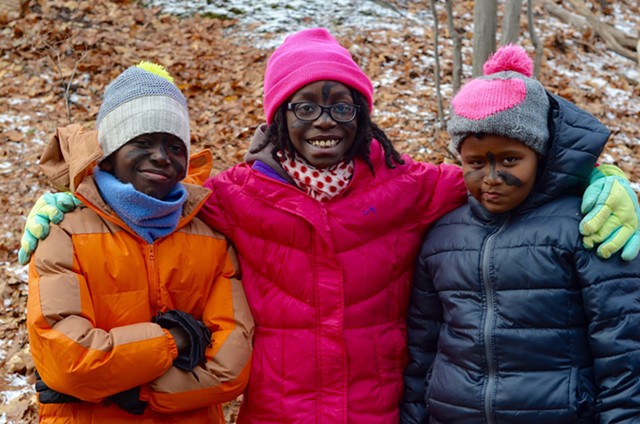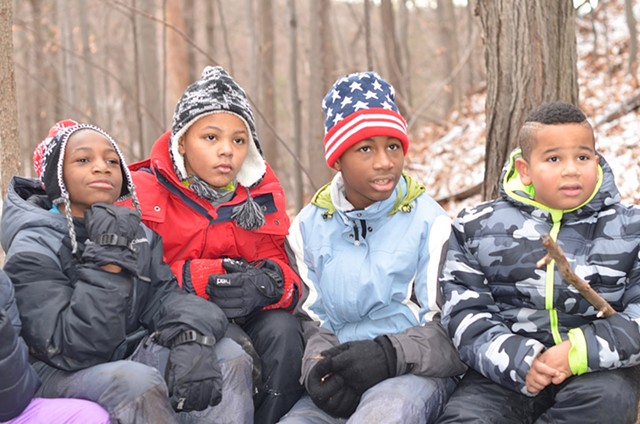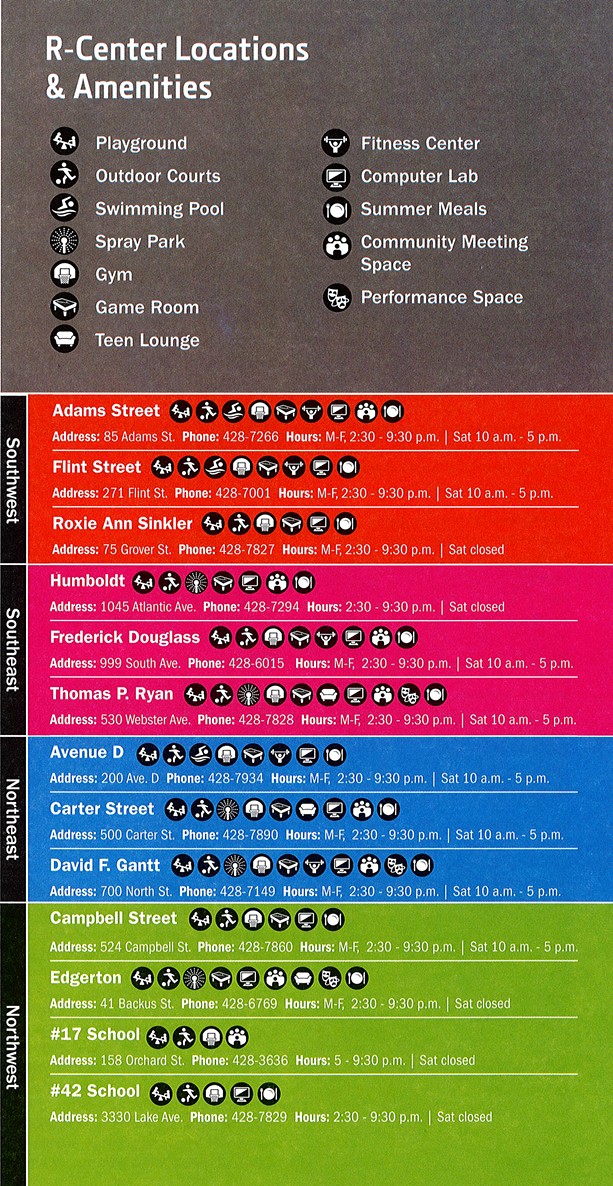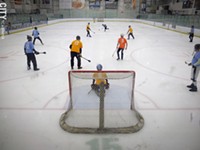The act of prying kids away from glowing screens and out into the cold winter light could be considered a modern Olympic sport. But the City of Rochester's Earth Explorers program, offered through several of its recreation centers, aims to engage city youth in free, year-round outdoor activities. Winter-specific programming includes hiking, sledding, snowshoeing, scavenger hunts, and educational discovery of the natural world.
Earth Explorers has been in action for more than a decade. In the last four years, it's been headed up by Sara Scott, Coordinator of Horticultural & Environmental Programming with the City of Rochester's Department of Recreation and Youth Services.
Many participating kids aren't particularly familiar or comfortable with outdoor winter activities aside from sledding, Scott says. "So it's been a process to get them outside and see that there's lots you can do."
Some days, the activity could be as simple as going for a group walk around the neighborhood, to see and discuss what's different in nature during the winter months.
Prior to working with the City of Rochester, Scott worked as a science teacher in New York City for five years. "I was doing some gardening with my students, and thought, 'man, I don't want to be in a classroom anymore,'" she says. "I love working with youth, but I felt like the classroom was just too restrictive. I wasn't inspired, and I didn't feel like I was doing a good job of inspiring my kids."
She switched things up, working at the Brooklyn Botanic Garden for a few years, coordinating an outreach program to Title 1 school students, bringing plants to the classroom. When she arrived in Rochester, she thought she'd adapt her experiences in education to recreation center programming. But those ideas quickly fell away.
"First I was like, 'I'm going to have a lesson plan, and we're going to have all these objectives...' then I was like, 'it's not going to happen,'" Scott says with a laugh.
At the rec centers, there's a basic week-to-week plan of giving the kids a taste of different nature-oriented ideas and activities, but the educational component is at times led by what the youth notice or how they respond to the environment, and answering their questions, she says.
Much of the time is spent on simple, unabashed discovery. "They're running around, picking up sticks, and just noticing things," Scott says. A big piece of it is getting the kids to slow down and look around to see that there's nature all around, even outside of the woods, she says.
This less-structured approach comes out of necessity — while there might be a core group of kids regularly involved in Earth Explorers, there are others who don't attend each week, and new faces periodically join in the fun.
The rec centers are completely open to the community, so one of the challenges is how to build on ideas or create a unit when you might have a completely different group of kids every day, Scott says.
Though the programming is open to all city residents between the ages of 6 and 18, Scott says the participants tend to skew younger. "Usually by the time they're 13, they're more interested in other things. The 7-to-12 range of kids are excited to learn and try something new; they still seem to have that playful side of going into the woods in the winter and seeing what it's all about."
As puberty takes hold, imagination isn't necessarily cool anymore, Scott says. "But the 13-year-olds will go sledding, that's something they'll still do," she says.
The different rec centers offer different programming, from environmental to sports, arts, or STEM focuses — and city schools will provide transportation after school to any of the centers, but parents and guardians are responsible for pick up. Check out the chart that accompanies this story online for more information on specific programming offered at each center.

- PHOTO COURTESY Vashon Jamal Broyld Sr.
Humboldt R-Center offers Earth Explorers programming year-round, but in the fairer seasons, Scott and her staff travel to six other rec centers to offer one activity per week that has some link to nature. "That could be a craft; cooking a healthy meal; or in the summertime, gardening," she says. And if there was enough interest at a specific center, the city could feasibly expand the year-round programming to another site.
In the warmer months, there's a focus on community gardens, facilitated by master gardeners through a partnership with Cornell Cooperative Extension. Several of the centers have raised-bed vegetable gardens, which organizers are planning to expand in the coming spring. Earth Explorers also partook in a volunteer program with The Friends of Washington Grove, in which kids learned to identify and remove invasive plants, discussed their negative impact, and helped plant native species in the grove.
Humboldt also has a green magnet program, with year-round environmental education. Every Wednesday, a van picks up participants and brings them to a park, where they engage in scavenger hunts, games, hiking, and nature observation.
Some community members might think going to Washington Grove or Seneca Park, for example, is a commonplace activity, Scott says. "But to the kids, it's like, 'Whoa. Where are we?'"
In late December, Earth Explorers partnered with Earth Works Institute for a winter day camp for the Humboldt youth at the Bayview YMCA, which entailed outdoor nature survival programming such as fire-building, hiking, foraging, and building structures.
When the weather becomes bitter, indoor discussions about nature prevail, and might revolve around how different animals survive throughout the winter.

- PHOTO COURTESY Vashon Jamal Broyld Sr.
Scott says she doesn't expect the programming to dramatically increase the youth's environmental consciousness, but they're notably more aware of an ethic regarding the environment.
Some of the immediate reactions the kids have to the outdoors are that things are dirty and gross, and that every bug they see should be smashed, Scott says. "Before you actually find out what it is, and what its purpose is, we're scared of it, and we want to kill it. And I think a lot of us approach a lot of things that way."
The programming attempts to commute those impulses into fascination. Scott tells the kids: "We're going to look at this compost, and there's going to be worms and bugs. And we're not going to kill any of it. We're going to actually pick it up, look closely, and see what's going on."
Scott says this hopefully plants seeds in youthful minds about how respect factors into other systems and relationships, so they take into consideration how their actions impact a garden, a trail, or other people.
"For me, it's about empathy for other people," she says. "I think when you understand how intricate the environment is and how delicate and amazing things are, how they work the way they do, you start to think about bigger things."
And bringing youth into a totally different environment, even for a few hours, can reveal an entirely different side of them, too, Scott says.

- PHOTO COURTESY Vashon Jamal Broyld Sr.
Kids who participate in the programming now can work their way into intern and then paid youth leadership positions, coordinating hikes and gardening activities, or programs of their own interest. The city also annually hires thousands of kids to work at recreation centers and partner agencies through its Summer of Opportunities Program.
Donations of equipment and warm winter gear from the community are always welcome. And parents who would like to participate in programming with their kids are welcome as well. Sara Scott is open to hearing what youth and parents would like to see more of, in terms of activities and opportunities. Send your ideas to [email protected].





